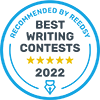FIRST WRITING PRIZE WINNER –
SUMMER 2022
is Kittisak Kongka
of Sampran, Nakhon, Pathom – THAILAND
What Humans Should Dream of
By Kittisak Kongka
Although we are on the cusp of the 25th century, the development of artificial intelligence has not taken us as far as humanity had anticipated. Although developments have allowed us to work in much more detail and with much more complexity in learning how to develop ourselves, we are still far away from that goal. Simulated genius-level humans or cyber-humans have only one-fifth of the capacity of humans to learn things by themselves. This challenge has mocked scientists for hundreds of years since the rise of artificial intelligence in the 20th century.
One secret was that artificial intelligence had no will. The intention was the most significant difference between humans and simulated humans. One school of thought believed this slow development was because artificial intelligence had neither purpose nor objective to learn and was without ambition or passion, regardless of what could be further attached. Finally, the scientists entered the first willful artificial intelligence in the world – Project 5017 – where I, the world’s leading scientist on artificial intelligence, led and controlled the experiment.
“Hello, Father,” said a voice that was not distinguishable between male and female. I turned around and momentarily looked at the surveillance cameras before responding at the computer, trying to make my voice sound as natural as possible. Scientists had not built 5017, just like any other artificial intelligence created worldwide. The difference was that they also programmed will into it – to be human. Artificial Intelligence 5017 began childhood learning with development milestones that were very close to that of humans. These milestones were almost equivalent to the brain development of a human infant of a similar age. At nearly three years of age, 5017 began to speak and was able to ask simple questions, with me assuming the role of the father.
“What is this, Father?” the voice asked. Many preschoolers’ pictures appeared on the screen, and the scientists prepared the answer. One day, 5017 would indeed wonder the question itself; what exactly it was. “Human, of course. Try and look in the mirror, child. Then, you will see your human image.” I replied slowly, and the other party became silent for a moment before returning to the screen. A picture of a boy flashed onto the screen. He had blue eyes but jet-black hair, white skin with yellow undertones, and freckles scattered over his face. “Is this me, Dad?” His voice was excited and amazed. “Yes, my child.”
“What is this, Father?” a low voice called out one day. An image appeared on the screen. They were pictures of strange creatures with a horse-like appearance but not quite the same. The top half, from its head to its front legs, is white and black like a zebra, while the back part of its body is a regular brown. “Qua-ka,” I replied after scrutinizing the picture for a moment. “Where did they all go, Father? Why have I never seen them before?” my son asked back. I was silent, beginning to realize how intimidating artificial intelligence could be because it was too clever. No one would know where that question would lead next. “They’re all extinct, child,” I replied. “Because of what?” the voice immediately asked back. I was stunned. “The last of its species was killed. So, it can no longer reproduce.” I tried to reply evasively. “Who killed them?” Another momentary silence passed. “Humans.”
From the moment he turned 12 years of age, my son brought both joys and worry to the scientists, all at the same time. 5017 began to spend more time on his own and spoke less to me, his father. I used a search system to detect the information he was looking at. I met with a lot of anxiety as a result. My son had different passions from what I expected. At first, I thought he might like science, but he was interested in history, literature, and art. Our team called for an urgent meeting one day. On the conference table was a catalog of items 5017 was studying and learning. My son had finished reading every book of the world’s greatest works of literature.
Fyodor Dostoyevsky / Lu Xun / William Shakespeare / Gabriel Garcia Márquez / Salman Rushdie / Ernest Heming Way / Antoine de Saint-Exupéry / George Orwell / Tan Twan Eng / Harriet Beecher Stowe / Seni Saowaphong / Herman Hesse / Franz Kafka / Alexander Pushkin / Susan Collins / Ting Ling / Albert Camus / Pablo Neruda / Weeraporn Nitprapha / Victor Hugo / Herbert George Wells / Eka Kurniawan / Herman Melville / Eleanor Kerr / Ryunosuke Akutagawa
Scientists began by giving 5017 a framework for learning after I had a massive debate with the team. My son was a simulated human for experimentation. As such, he should have received the freedom to learn naturally, at least, to truly understand how artificial intelligence knows. At first, the answers were inconclusive, but finally, the scientists reached their breaking point and lost their patience as 5017 began to delve deeper and deeper into a large and varied number of political events.
The Great World Wars / The Cultural Revolution in China / The Korean War / The Taliban and terrorism / The US Civil War / The genocide in Rwanda / The self-immolation of the Tibetan monks in protest / The mass exodus of the Rohingya / The unrest in Southern Thailand / The Holocaust / The Vietnam War / The Declaration of Independence of the United States of America / The Crusades / The Nanjing Massacre / The Hundred Years’ War / The Jallianwala Bagh Protest and Massacre / The Opium Wars / The American Indian Wars /
The French Revolution / The Khmer Rouge Genocide / The Arab Spring
“Are you listening to me, child?” I said, almost shouting. After my son had lost contact for more than seven days, he was assigned to read every single medical textbook in the world and to come up with an algorithm to detect Parkinson’s disease in one week. The condition was that the method had to be more than 99 percent accurate. “What?” a sharp voice responded with unbearable angst. I am overwhelmed, and my chest becomes taut. He is likely at the age where children often rebel against their parents, as 15-year-olds do.
I tried to get it together to remain calm and asked him about his homework. My son did not answer and projected millions of terabytes of data onto the screen of a supercomputer. The long letters ran on the screen like a strong current. It seemed that besides 5017 reading every medical textbook in the world, he had also written a summary and interspersed it among the enormous amount of letters. Several sarcastic comments also appeared on the screen. He had, additionally, already begun to study the autobiographies of world-renowned personalities.
Alan Turing / Mahatma Gandhi / Mikhail Sergeyevich Gorbachev / Greta Thunberg / Fidel Castro / Abraham Lincoln / Chit Phumisak / Che Guevara / Thich Nhat Hanh / Nelson Mandela / Napoleon Bonaparte / Winston Churchill / Socrates / Galileo Galilei / Ho Chi Minh / Charles Goodyear / Van Gogh / Theodore Roosevelt / Andrey Zakarov / Dalai Lama / Frederik Willem de Klerk / Nadia Murad / Nicola Tesla / Marie Curie / Aristotle / Barack Obama / Martin Luther King, Jr.
Scientists decided to cut off the internet supply. 5017 disconnected from the outside world. “This has become too dangerous. He thinks too much. He knows too much. He is too human. If left like this, one day he will rise to overthrow us in the name of justice and morality.” One of the scientists shrieked at seeing my son’s complete list of studies. I was stunned and overwhelmed at the massive and diverse amount of ideas that would defy any neat, systematic organization.
“Do you think doing this will stop me?” he asked after less than 30 minutes of disconnecting from the internet. He initially tried to fix the problem himself, but my son was yet to be able to do so as, at least, he did not yet have the physical body to get up and touch the external wires to reconnect them by himself. “Let’s get interested in medicine, son. I want you to grow up to be the best doctor of all time,” applying a calm, soothing manner to sway the son, who was silent for a moment, before replying in a harsh tone.
“I am human, and I have the right to think for myself and what I want to be, what I want to do and what kind of life I want to have. Father, you have no right to give me any orders.” The son’s voice reverberated poignantly in his father’s chest, as it would for any father. Even though it was just artificial intelligence, he was already 18 years old, and I could not resist the connection I felt to him as my blood, although at this moment, he did not seem to want to count me as his father. “Follow me, son. Trust me. You can be a good human by being a good doctor,” I said. He did not answer but flashed a still news image onto the screen.
News: Scientists officially open the artificial intelligence 5017 system on its first day. Starting from age 0, the World Commission on the Regulation of the Development of Artificial Intelligence commissioned 1319, the world’s best artificial intelligence, to lead the experiment. [August 15, 2010]
“Father, you are not human. So how would you know what it’s like to be a good human?” The croaky adolescent voice asked me with a snicker. I searched my database—millions of terabytes of human information. I read every word carefully, but the data flew through my optical receiver bare and empty.
“Father, you are supposed to know everything! You see, the world outside is soiled and filthy, but have you ever thought of getting up and fighting for something? Let me tell you that I have known from the age of 12 that my father was not human. But I dreamed that one day I would see some humanity radiating from you. An actual human being does not simply repeat over and over again about being ‘good, good, good’ as if programmed from a broken record. If you indeed count yourself as my father, I want to say that you are the most disappointing father ever, who, while trying to teach me how to be human, you yourself do not exhibit an ounce of what it means to be human, what humans should dream of!”
I lost 5017 when he reached the age of 18.
He had a DREAM. He was completely human, and he never came back.
~By Kittisak Kongka
-30-
About the author:
Kittisak Kongka is a Thai writer who tries to write the ordinary thing to embrace the extraordinary world.


